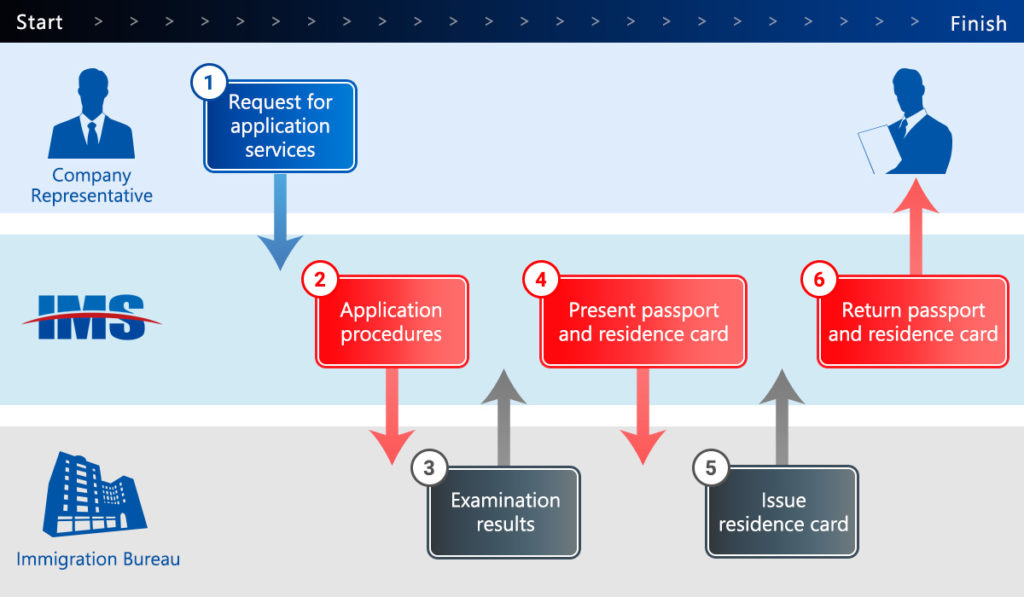
Employment Eligibility: Engineer/Specialist in humanities/International services visa

The “Engineer/Specialist in humanities/International services” visa is based on a contract with a company within Japan and is used to invite foreigners to engage in work that requires professional expertise in the fields of science and humanities, or to engage in work that requires knowledge or services requiring thinking and sensitivity based on foreign cultures.
It is generally required for foreigners to obtain employment eligibility (i.e. a work visa) in order to stay in Japan and work full-time. The Engineer/Specialist in Humanities/International Services visa is a typical work visa that is mainly for technicians and white-collar professionals. Most foreigners employed at the average Japanese company obtain and work on an Engineer/Specialist in Humanities/International Services visa. This visa does not correspond to simple or unskilled labor.
※Previously, this visa used to be split into two categories -- Engineer and Specialist in Humanities/International Services -- but they were combined into one visa in April 2015 due to a legal amendment.
Fields Corresponding to the Engineer/Specialist in Humanities/International Services visa
The fields are classified into the following categories:
Engineering/technology-related
Services that require technology and/or knowledge of the sciences, such as careers in the fields of science, engineering, or other natural sciences.
Examples: System engineering, programming, civil engineering/construction design
Humanities-related
Services that require knowledge of the humanities, such as careers in the fields of legal sciences, economics, sociology, and other humanities.
Examples: Sales, consulting, marketing, legal services, human resources, accounting
International services-related
Services requiring thinking and sensitivity based on cultures unique to foreigners.
Examples: Translation, interpretation, language tutoring, overseas trading, clothing and interior decorating design
Period of Stay
There are four durations for period of stay: 3 months, 1 year, 3 years, and 5 years. The duration will be determined after the application is examined by the Immigration Bureau of Japan. Period of stay renewal procedures are necessary to continue working past the visa's expiration date.
The period of stay granted depends on the expected period of work (contract period), the business size of the hiring company or organization, and the stability of business conditions. The Immigration Bureau will examine the entire application comprehensively before making their decision. Therefore, the desired period of stay may not necessarily be granted.
Requirements
(Academic/employment history, as applicable)
Graduated from university or received an equivalent education or higher, either in Japan or abroad
The subject the applicant majored in and the duties of their position at the sponsor company must match. For this reason, it is important to confirm the contents of the applicant’s major using their graduation certificate and school transcripts.
Graduated from a Japanese vocational school and issued a diploma
Foreign vocational schools are not applicable, and applicants must have graduated from a vocational school in Japan. Also, the applicant’s major and the content of their job must be related.
Over 10 years of work experience (3 years of work experience in the case of international services)
In our company’s experience, in order to obtain an Engineer/Specialist in humanities/International services visa the applicant must prove past work experience. For this reason, it is very important to obtain documents from previous companies documenting the applicant’s work experience. Of course, applicants will not be able to receive this type of visa if they do not have previous, related work experience.
※University graduates with a bachelor’s degree or higher can obtain a visa for work related to language translation, interpretation, or instruction, even without practical experience as described above.
(Salary/Compensation)
Equivalent or better salary as that of Japanese employees who do the same work
When hiring foreigners on the Engineer/Specialist in humanities/International services visa, the foreign employee must receive a salary equivalent to their Japanese counterparts. Employees should not receive lower salaries just because they are foreign.
Notes on Academic/Employment History
In principle, obtaining a work visa requires applicants to have completed an undergraduate or graduate degree from a Japanese or foreign university. Receiving a diploma from a Japanese vocational school is also permitted. If applicants do not meet the academic requirements (such as high school graduates), then they need to have at least 10 years of work experience. For work related to International services, only 3 years of previous work experience is required.
In order to meet the work experience requirements for the Engineer/Specialist in Humanities/International Services visa, you must submit documents from previous employers (company, organization, etc.) certifying the content and duration of work experience. Applicants who change jobs often will need to submit documents from more than one company or organization, as applicable to their circumstances.
※Applicants who have graduated from a university outside of Japan must submit a copy of their graduation certificate and transcript. Graduates of a Japanese university or vocational school must submit their original graduation certificate (or certificate of completion) and transcript.
Notes on Salary/Compensation
Foreign employees must be paid at equivalent or higher salaries than their Japanese counterparts. "Counterparts" in this regard refers to Japanese employees who have equivalent status, technological skills, and experience in the same company as where the foreign employee works. The Immigration Bureau's examination will determine if the applicant's salary/compensation is appropriate and fair. If there are no Japanese employees with the same role at the same company, the amount of salary/compensation should be determined based on industry and regional standards.
Hiring Company/Organization Eligibility
In order for companies and organizations to be seen as capable of employing foreigners, the management must be stable and such stability and continuity is expected in the future. There is a common misconception that corporate deficits imply a company will be seen as unable to pay salary and therefore have their application denied. However, the mere existence of deficits does not necessarily mean that an application will be denied. Companies and organizations with deficits must provide some form of business plan outlining how the employment of the foreign worker will be able to continue into the future (such as salary payment structure), as well as an explanation of the company's overall business conditions expected going forward. Newly established companies and organizations (those that have yet to do account settlement) will need to submit business plans in lieu of financial statements.
【Visa Procedures for Hiring Foreigners Outside Japan】
In order to recruit foreigners outside of Japan for work, the Japanese hiring company must first submit an “Application for Certificate of Eligibility (COE)” to the Immigration Bureau in Japan. When this certificate is issued, the person who will be the one to come to Japan for work (foreign applicant) will apply for a Japanese work visa in their home country. The application for COE means that an employee of the hiring company (affiliated institution) acts as an agent and submits the application to the Immigration Bureau. It takes around 3 months for the COE to be issued, so we recommend that you apply well in advance.
Our company offers consultation and full support for hiring companies and foreign applicants, including application form creation.
【Visa Procedures for Hiring Foreigners Within Japan】
The procedures to hire foreigners within Japan differs based on the foreign applicant’s current status of residence.
Hiring a graduate of a Japanese university or vocational school, currently on a “Student” visa
In this case, it is necessary to apply for a Change of Status of Residence from “Student” visa to “Engineer/Specialist in humanities/International services” visa. However, the content of the application depends on the graduation date of the international student.
If the student will graduate in September but has a provisional offer to join the company the following year in April, first apply for a Change of Status of Residence from “Student” to “Specified Activities”. Approximately 3 months before the hired start date, a second application for Change of Status is necessary to change from “Specified Activities” to the “Engineer/Specialist in humanities/International services” visa. In other words, two change procedures are required.
If the student will graduate in March and join the company in April, it is necessary to apply for a Change of Status of Residence from “Student” to “Engineer/Specialist in humanities/International services” 3 months before the hired start date, even before graduation. In this case, even if permission is granted before the graduation date, the applicant will receive their work visa upon submitting an original copy of their graduation certificate.
Hiring a foreigner who already has a work visa
If the foreign employee already has an Engineer/Specialist in humanities/International services visa and there is no change in the content of their job description, then they can be hired as-is, and only a “Notification Regarding Contract Period” needs to be submitted to the Immigration Bureau within 14 days of hire. If the work visa’s expiration date is near, then just applying for a Renewal of Period of Stay is fine.
Hiring a foreigner who has a Status of Residence with no restriction on activities in Japan
There are no restriction on activities in Japan for foreigners who have one of the following visas: Permanent Resident, Spouse of Permanent Resident, Spouse or Child of Japanese National, Long-term Resident, or Special Permanent Resident. Because of this, they can be hired without a visa application. In addition, the Spouse of Permanent Resident, Spouse or Child of Japanese National, and Long-term Resident visas each have a listed period of stay, so they will only need to apply for Renewal of Status of Residence before the expiration date.
※The type and period of stay for each status of residence are printed on the front of the residence card (visa), so be sure to check before hiring.
Company Categorization When Applying for a Work Visa
The documents to submit for “Application of Certificate of Eligibility”, “Application for Permission to Renew the Period of Stay”, and “Application for Permission to Change Status of Residence” are broken into categories corresponding to the size of the company, and each category is different.
| Category 1 | Category 2 | Category 3 | Category 4 |
|---|---|---|---|
| (1) Companies listed on the Japanese stock exchange (2) Insurance mutual companies (3) Japanese or foreign national/local governments (4) Independent administrative corporations (5) Special corporations/licensed corporations (6) Public interest corporations of Japanese national and local governments (7) Public corporations listed in Appendix 1 of the Corporation Tax Act (8) SMEs that meet certain conditions | In the total list of legal records (such as withholding slips for employment income for the previous year), organizations/individuals with a withholding tax amount of 15 million yen or more in the total income tax withholding slip table for the previous fiscal year | Organizations/individuals (excluding category 2) to which the total list of statutory records (such as withholding slips for employment income for the previous year) were submitted | Organizations/individuals which do not fall under any of the other three categories |
※Documents to be submitted differ depending on the size of the company in the above categories, and specific documents to submit vary depending on each applicant’s situation. Please contact us for more information.
Employment Eligibility: Intra-Company Transferee visa

Intra-company transfer refers to employees of a foreign-owned organization (public or private institution with a head office, branch office, or other location within Japan), who will be transferred to Japan for a set period of time in order to conduct business activities as allowed by the Engineer/Specialist in Humanities/International Services visa. As an example, a transferee from an overseas office (between group companies).
- Transfers between head office and branch office
- Transfers between parent company and subsidiary
- Transfers between parent company and sub-subsidiary, or between subsidiary and sub-subsidiary
- Transfers within subsidiary company
- Transfers within sub-subsidiary company
- Transfers to affiliate company
Intra-Company Transferee standards
One or both of the following must apply to the Intra-Company Transferee.
- Immediately prior to the transfer pertaining to the application, the applicant must be employed at the foreign head office, branch office, or other office for at least one year, engaged in work that falls under the scope of the Engineer/Specialist in Humanities/International Services visa status.
- The applicant must be receiving equivalent or better compensation as that of Japanese employees who do the same work
Period of Stay for Intra-Company Transferee visa
There are four durations for period of stay: 3 months, 1 year, 3 years, and 5 years. The duration will be determined after examination by the Immigration Bureau of Japan. Period of stay renewal procedures are necessary in order to continue working past the visa's expiration date.
The period of stay granted depends on the expected period of work (transfer/dispatch period), the business size of the hiring company or organization, and the stability of business conditions. The Immigration Bureau will examine the entire application comprehensively before making their decision. Therefore, the desired period of stay may not necessarily be granted.
Differences between the Engineer/Specialist in Humanities/International Services visa
There are many similarities between inviting foreign employees to Japan on either the Intra-Company Transferee visa and the Engineer/Specialist in Humanities/International Services visa, but the main differences are as follows.
Qualification requirements
The Engineer/Specialist in Humanities/International Services visa requires basic academic requirements such as graduating from university or having at least 10 years of work experience.
Meanwhile, although there are no academic or work experience requirements for the Intra-Company Transferee visa, the applicant (transferee) must have at least 1 year employment with the foreign company, while engaged in duties allowed by the Engineer/Specialist in Humanities/International Services visa status.
Whether or not to apply as a transferee
Upon receiving an Engineer/Specialist in Humanities/International Services visa, only a notification to the Immigration Bureau is required upon changing companies, if the new job duties involve engineering, the humanities, or international services. No new work visa application is required.
Changing companies while on an intra-transferee visa will require an application for Change of Status of Residence, such as permission to change to the Engineer/Specialist in Humanities/International Services visa.
IMS Procedures for Change of Status of Residence/Extension of Period of Stay Applications
Applying for a Japanese work visa without help means considerable time and effort, as well as going to the Immigration Bureau at least twice: once to submit your application, and again to receive the results of the examination. The administrative scriveners at IMS are qualified to submit applications and receive the results on behalf of their clients -- all without foreign applicants making the trip to the Immigration Bureau themselves.






